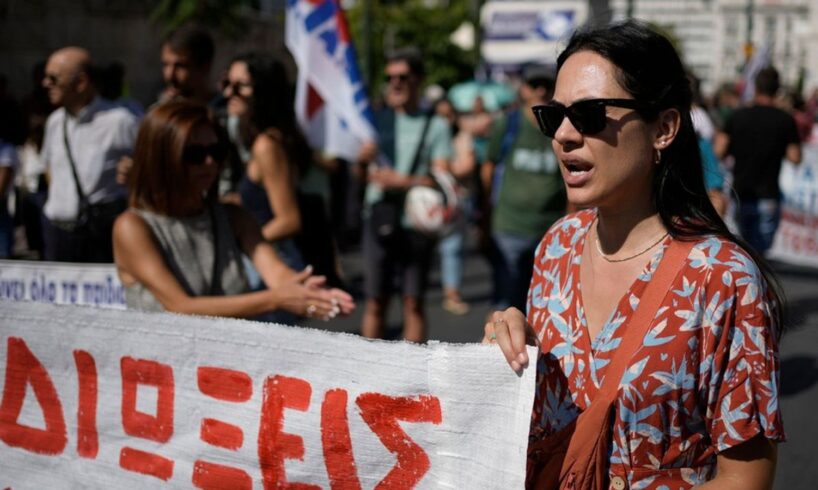
Protesting workers during a 24-hour civil servants’ strike over a planned new disciplinary code for state workers which unions argue will compromise their employment rights, in Athens, Greece, on Thursday, Aug. 28, 2025 [AP Photo/Thanassis Stavrakis]
On Thursday, public sector employees in Greece held a one-day strike to protest against a anti-worker law introduced by the right-wing New Democracy (ND) government. The law allows working hours of up to 13 hours a day and tightens disciplinary measures against public sector employees.
The new disciplinary law was passed in parliament on Thursday with the votes of the governing party, while outside on Syntagma Square hundreds of workers gathered. A rally was also held in Thessaloniki, the country’s second-largest city.
With these legal changes, the ruling class is preparing for a turbulent autumn–not only in Greece, but across Europe. From Berlin and Paris to Athens, all governments are carrying out a general assault on workers’ social and political rights in order to finance massive military rearmament. In France, mass protests are scheduled in September against the austerity budget.
In Greece, the latest strike takes place against the background of a deep social and political crisis, which has intensified since the beginning of the austerity dictates and has now reached boiling point. Anger among Greek workers and students over high living costs, low wages and long working days is erupting.
With Thursday’s one-day strike, the union leaderships are attempting to pre-empt a broader protest movement. The memory of the recent mass demonstrations in March, which demanded the truth be uncovered about Tempi rail disaster, and which partly assumed a spontaneous character, is still fresh. As recently as April, workers had demanded higher wages in a one-day general strike.
The strike was called by ADEDY, the public sector union federation. Among those participating were unions representing hospital doctors, teachers, municipal employees and judiciary staff.
Originally, Greek air traffic controllers had also planned a four-hour walkout. But a court in Athens declared their stoppage unlawful, whereupon the controllers’ union withdrew its strike call. Similar strike bans have been imposed several times in recent years to suppress opposition.
Tellingly, GSEE, Greece’s other major union federation representing the private sector, merely published a toothless criticism of the law, but did not call on its members to strike or take other action. Clearly, in the middle of the summer season, union leaders are concerned with not endangering the profits of the tourism industry–even if only by a harmless one-day protest.
The new labour law includes several changes aimed at intensifying capitalist exploitation and cementing it legally:
Introduction of the 13-hour day. The law allows the extension of the daily working time to up to 13 hours. In addition to the standard 40-hour week, up to eight hours of overtime per week may be added.Introduction of a four-day week, with 40 hours spread across four days of ten hours each. Last year, a six-day week had already been legalised for certain sectors.Short-term hiring of seasonal and temporary staff is to be made possible via a smartphone app.Tightened disciplinary law for civil servants, aimed at criminalising political opposition.
The labour ministry justifies the measures with the usual clichés of “cutting bureaucracy”, tackling the “shortage of skilled workers” and making the labour market more “flexible”–all terms that thinly veil the fact that the law is designed to systematically worsen working conditions and undermine labour rights in the interests of the corporations. The eight-hour day, already largely undermined during years of austerity, is now being formally abolished.
The anger of demonstrators is directed above all against the tougher disciplinary regime. It represents a massive attack on democratic freedoms and workers’ rights. Anyone who resists the long working days, low wages and catastrophic working conditions is to be silenced through repression.
The new disciplinary law introduces harsher penalties, including dismissal, wage cuts, demotion and fines of up to €100,000. Disciplinary proceedings are to be greatly accelerated. Newly created disciplinary councils in the public sector will no longer include workers’ representatives or members of the judiciary.
Teachers are particularly concerned: in future, it will be considered a disciplinary offence if they refuse to take part in performance evaluations. The government has introduced an evaluation system in schools to monitor and pressure teachers through regular assessments. In 2021, this step triggered mass protests among teachers and students. At the time, the education minister was Niki Kerameos–now labour minister and responsible for the draconian labour law.
At its core, the harsher disciplinary measures are aimed at intimidating workers, bringing them politically into line, and criminalising those who engage in union or left-wing activities.
If Greece becomes the first EU country to introduce a 13-hour day, it merely legalises an already existing reality: most workers already have to take on two or more jobs to make ends meet. The eight-hour day has long existed only on paper.
Kerameos cynically justified the 13-hour day with the words: “Firstly, it is an option, not an obligation. Secondly, the employee must agree. Thirdly, this way as an employee you don’t need a second job.” A Greek worker earning just €700 a month in a full-time job will now “be allowed” to work 13-hour days instead of seeking a second job. Of course, there is no question of it being “voluntary”. The necessity of survival forces workers into overlong working days.
The 13-hour day in Greece would open the door to similar legal changes across Europe. In Germany, Chancellor Friedrich Merz (Christian Democrat, CDU) already declared in May: “We must work more and above all more efficiently in this country again.” The German Economic Institute (IW) promptly provided the statistical fodder: “An IW analysis based on OECD data confirms the Chancellor’s point: a German of working age–between 15 and 64–worked an average of 1,036 hours in 2023. A Greek worked 1,172 hours, a Pole 1,304 hours.”
In Greece and Poland, which are now being held up as models, the German ruling class, under the umbrella of the European Union, has created a social catastrophe in recent years and trampled workers’ rights underfoot. It now aims to implement the same in Germany.
The scale of social hardship is especially clear in summer: while many Greeks work in tourism, almost half of all Greeks over 16 (46 percent) could not afford even a one-week holiday in 2024. Greece thus ranks second to last in the EU, just ahead of Romania. The main reasons are high prices, rising housing costs and stagnant wages.
At the same time, more and more workers are falling victim to brutal exploitation. Overwork, deregulation and lack of workplace safety frequently leads to fatal accidents in Greece–as in the US and Italy. The true extent is not reflected in official statistics. According to the Greek statistics office, 51 people died in workplace accidents in 2023. But the real number is far higher, since only around 30 to 40 percent of accidents are recorded. The Federation of Technical Company Trade Unions (OSETEE) counted 179 workplace fatalities in 2023 and around 150 last year–three times the official figure.
The ADEDY union leaders, who organised Thursday’s strike, do not actually want to mobilise effective resistance against the government but rather ensure that no such resistance develops outside their control. For decades they have been jointly responsible for today’s conditions by isolating and containing countless protests.
They also belong to the same political milieu and social layer as the rulers. The current chairman of ADEDY, Apostolos Mousios, is a long-time functionary of the right-wing DAKE union faction, closely aligned with New Democracy. His predecessor was a leading ND member.
The nominal opposition parties–Syriza, the social-democratic Pasok, and the Stalinist KKE–voted against the disciplinary law in parliament but, like the unions, they defend the capitalist system. In the case of Syriza and Pasok, they implemented years of brutal EU-dictated austerity.
The defence of social gains places Greek workers before the task of building their own organs of struggle, independent of the pro-capitalist unions and parties: rank-and-file action committees, internationally linked through the International Workers Alliance of Rank-and-File Committees (IWA-RFC), controlled by the workers themselves, and preparing a genuine general strike–not isolated pseudo-strikes staged by the unions as accompaniment to austerity.
At the same time, social attacks can only be repelled through a fight for a socialist perspective against war policy. The Athens government has announced a massive rearmament programme and plays an important role in NATO’s proxy war against Russia. With defence spending at 3.5 percent of GDP, Greece already has one of NATO’s largest military budgets.
By 2036, €25 billion is to be invested in rearmament. Prime Minister Kyriakos Mitsotakis spoke in April of the “most drastic transformation” in the army’s history. Among other things, a new air defence system called the “Shield of Achilles” is planned, modelled on Israel’s Iron Dome.
Working people must intervene and, in alliance with their European brothers and sisters, stop the war madness and the associated attacks. This requires an independent socialist perspective and the building of the International Committee of the Fourth International in Greece and across Europe as the new revolutionary leadership of the working class.
Sign up for the WSWS email newsletter





